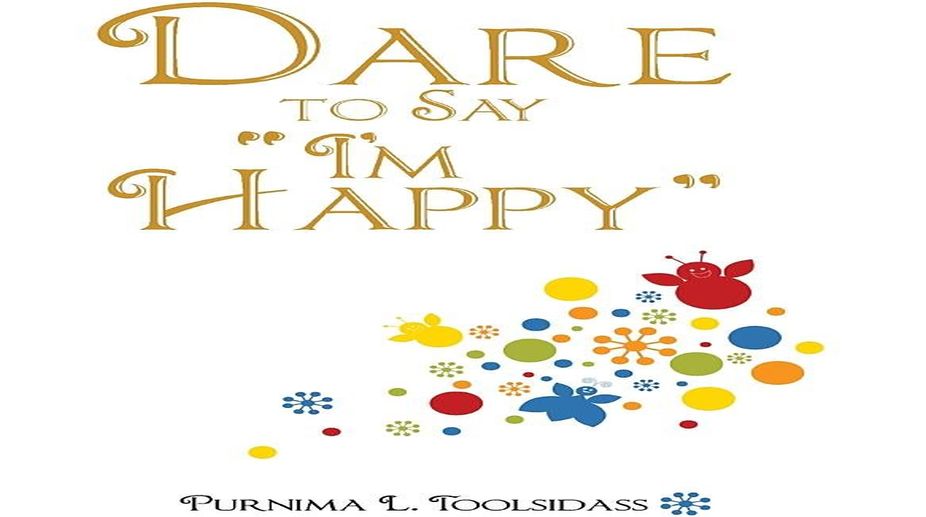According to Pursuit-of-Happiness.org, Socrates, born in Athens in 460 BCE, has a unique place in the history of happiness. Celebrated as the first person in the West, Socrates argued that happiness is actually obtainable through human effort. And, it was at a time when Greeks had a rather cynical view of human existence.
They believed happiness was a rare occurrence and reserved only for those whom the gods favoured. The idea that one could obtain happiness for oneself was considered arrogance, a kind of overreaching pride, and was to be met with harsh punishment.
From Socrates onwards, while several philosophers and religious leaders of all faiths believed that true and lasting happiness is indeed possible, it has also been labelled as “the most un-understood phenomenon in the world!”
Poornima L Toolsidas’s book, Dare to say “I’m Happy is an inspiring work in terms of the intrinsic essence, natural expression and life-realigning message. She meditated vigorously on the cause of unhappiness to explore some solutions before it gets out of hand. The book doesn’t have a whole lot of narrative pull but there is constant flow of insights, wisdom, and practical guidance gathered out of the author’s interaction with various people, which she has drawn on in her writing.
The book is greatly relevant to today’s times as things like political rhetoric, celebrity marriages et al make greater news, create bigger effect and occupy larger attention than issues like rickshaw puller’s son cracking UPSC, IIT and IIM, child labour and water crisis. For most of us, indulging into the former, the quest of happiness remains in the narrow genesis of the pleasure principle. Also, in a world full of materialism, chasing happiness will be elusive if doing whatever we want is justified on the mistaken premises. It’s primarily because happiness represents virtue, justice and the ultimate meaning of human existence.
Poornima in her 12-chapter book emphasises that all problems in life can be condensed into two basic types — not getting what we want and getting what we don’t want. She clarifies when we lack real satisfaction; we try to obtain it from diversions that give excitement or pleasure. She reasoned desires enslave us, whip us into submission, making us do things not righteous.
There could be debate whether happiness is a destination or journey, but there can’t be any debate whatsoever regarding good deeds, a primary source of happiness. Small acts of kindness, gestures of affection, compassionate words and little help to some — all add up to good deeds radiating pro-social behaviour.
The author reminds me of Socrates again as she questions why is it that some people are unhappy even when they have so much, and some people are happy even when they have so little. Socrates was known for living a frugal life. “Why do you waste your time in the market,” his friend asked him once, “when you never buy anything?”“Because,” Socrates replied, “When I go to the market, I discover how many things I am perfectly happy without.”
The author in a chapter, “The Art of Giving” mentions, “A smile is quite a funny thing; it wrinkles up your face. And when it’s gone, you’ll never find its secret hiding place. But far more wonderful it is to see what smiles can do; you smile at one, she smiles at you, and so one smile makes two!” In quest of happiness what Phyllis Diller once said is no less significant, “A smile is a curve that sets everything straight”.
Poornima, in yet another chapter, explains anger is the reaction of our wishes being thwarted. Its intensity depends on the intensity of our desire. She finds attachment is the dormant cause of desire, anger and greed. And, according to her, greed is perhaps, the easiest to convert into an ally. We just have to become greedy for the important things in life. They are the things that help bring deep happiness. And, nothing gives greater happiness than giving happiness.
As I happened to meet the author once, in response to one of my observations she quipped that we have little control on others in this Kali Yuga (age of vice), but what prevents us from establishing Satya Yuga (Age of Truth) within. She is sensitive to spiritual values having intense desire to make the most of his best for the sake of others.
The book will be misconstrued if it is pictured as an attempt to answer the happiness questions of every kind as such. But what makes the book such a pleasure to read and internalise is its refreshingly straightforward narration of facts. People finding themselves sinking into discontent and deep funk and are struggling to climb out of, it’s time to read Dare to say “I’m Happy for advancement in life as also for life satisfaction.
The reviewer is a freelance contributor.












